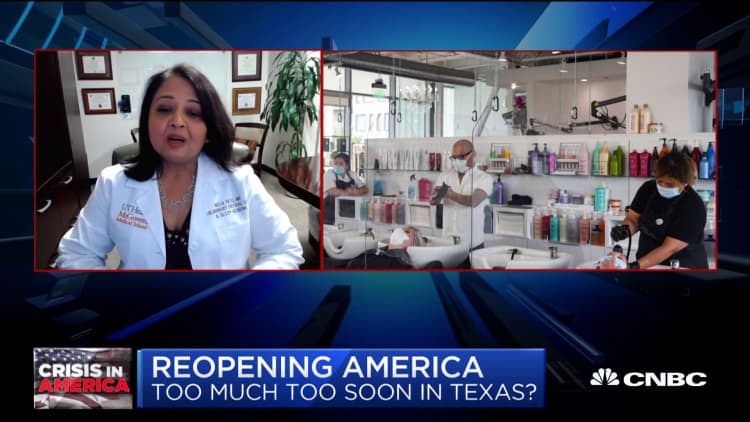Texas health authorities said there were 2,287 patients sickened with Covid-19 across its hospitals on Sunday, the sixth new high for coronavirus hospitalizations in the state in less than a week.
The new total is up from 2,242 patients on Saturday, according to updated data from the Texas Department of State Health Services. In the past week, Wednesday was the only day that Texas didn't set a new record for hospitalizations.
Texas was among the first states to relax its statewide stay-at-home order, allowing it to expire April 30. Infectious disease experts say the steady rise in Covid-19 cases and hospitalizations in Texas and other states will likely add to scrutiny from some U.S. lawmakers that some states opened businesses too early.

At least 23 states are seeing a rise in cases as of last week, according to a CNBC analysis of Johns Hopkins data.
"A spike in new cases is unavoidable due to the early reopenings, which is combined with other developments like protests to create fertile ground for its ongoing transmission," said Yanzhong Huang, a public health researcher at the Council on Foreign Relations and director of the Center for Global Health Studies at Seton Hall University.
"Before a vaccine becomes widely available, we can only hope that ... the pathogen becomes less virulent and people come to treat it like seasonal influenza," he added.
Coronavirus hospitalizations, like new cases and deaths, are considered a key measure of the outbreak because it helps scientists gauge how severe it may be. Research shows that it can take anywhere from five to 12 days for people to show symptoms from the virus.
On Friday, the Centers for Disease Control and Prevention said states may need to reimplement the strict social distancing measures that were put in place earlier this year if U.S. coronavirus cases rise "dramatically."
"Right now, communities are experiencing different levels of transmission occurring, as they gradually ease up onto the community mitigation efforts and gradually reopen," the CDC's deputy director for infectious diseases, Jay Butler, told reporters during a press briefing.
"If cases begin to go up again, particularly if they go up dramatically, it's important to recognize that more mitigation efforts such as what were implemented back in March may be needed again," Butler said.
— Chart by CNBC's Nate Rattner


